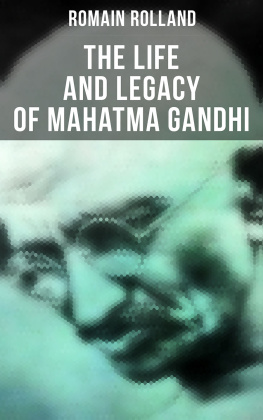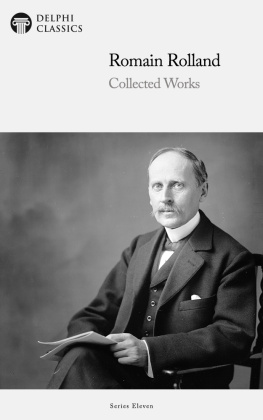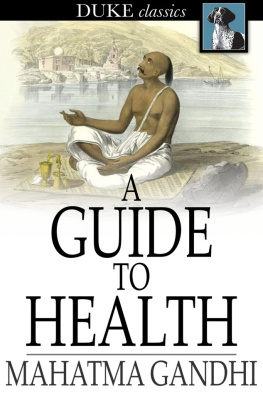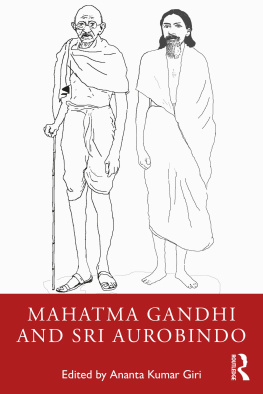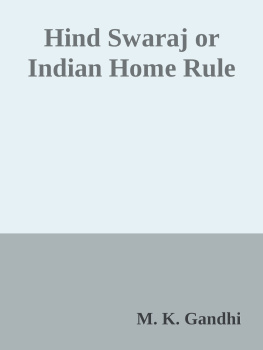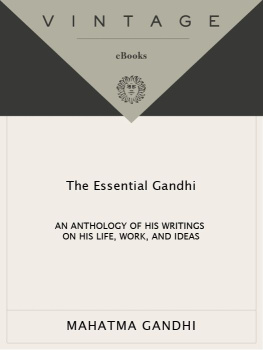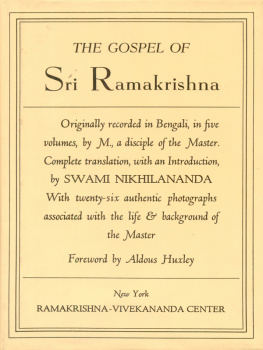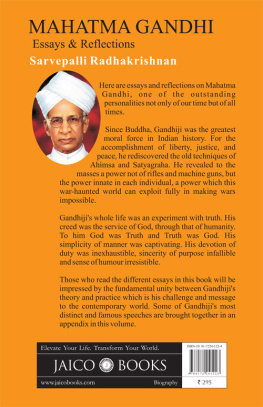Table of Contents

MOHANDAS KARAMCHAND GANDHI.
In connection with the present essay I wish to tender my affectionate thanks to my faithful collaborator, my sister, and to my friend, Kalidas Nag, whose deep knowledge and indefatigable kindness have guided my steps through the forest of Indian thought.
I also wish to thank the publisher, S. Ganesan of Madras, for having placed, spontaneously, his publications at my disposal.
The literal translation of Mahatma, the name which the people of India gave to Gandhi, is "the great Soul," maha, great; atma, soul. The word goes back to the Upanishads, where it is used in speaking of the Supreme Being, and, through communion of Knowledge and Love, of those who become One with Him:
"He is the One Luminous, Creator of All,
Mahatma,
Always in the hearts of the people enshrined.
Revealed through Love, Intuition, and Thought,
Whoever knows Him, Immortal becomes...."
Tagore, on a visit to Ashram, Gandhi's favorite retreat, quoted this stanza, referring to the Apostle.
PART ONE
1
Dark, tranquil eyes. A small frail man, a thin face with large protruding ears. His head covered with a little white cap, his body clothed in coarse white cloth, barefooted. He lives on rice and fruit and drinks only water. He sleeps on the floorsleeps very little, and works incessantly. His body does not seem to count at all. There is nothing striking about him, at first, except his expression of "great patience and great love." W. W. Pearson, who met him in South Africa in 1918, instinctively thought of St. Francis of Assisi. There is an almost childlike simplicity about him.
This is the man who has stirred three hundred million people to revolt, who has shaken the foundations of the British Empire, and who has introduced into human politics the strongest religious impetus of the last two thousand years.
2
His real name is Mohandas Karamchand Gandhi. He was born in a little semi-independent state in the northwestern part of India, at Porbandar, the "White City" on the sea of Oman, October 2, 1868. He comes of an ardent and active race, which to this day has been split by civil strife; a practical race, commercially keen, which established trade relations all the way from Aden to Zanzibar. Gandhi's father and grandfather were both leaders of the people and met with persecution because of their independent spirit. Both were forced to flee for safety, their lives in peril. Gandhi's family was well-to-do and belonged to a cultivated class of society, but it was not of superior caste. His parents were followers of the Jan school of Hinduism, which regards ahimsa,
While still a boy he passed through a severe religious crisis. Shocked at the idolatrous form sometimes assumed by Hinduism, he became, or imagined he became, an atheist, and to prove that religion meant nothing to him he and some friends went so far as to eat meat, a frightful sacrilege for a Hindu. And Gandhi nearly perished with disgust and mortification. At nineteen he was sent to England to complete his studies at the University of London and at the law school. Before his leaving India, his mother made him take the three vows of Jan, which prescribe abstention from wine, meat, and sexual intercourse.
He arrived in London in September, 1888, and after the first few months of uncertainty and deception, during which, as he says, he "wasted a lot of time and money trying to become an Englishman," he buckled down to hard work and led a strictly regulated life. Some friends gave him a copy of the Bible, but the time to understand it had not yet come. But it was during his stay in London that he realized for the first time the beauty of the Bhagavad Git. He was carried away by it. It was the light the exiled Hindu had been seeking, and it gave him back his faith. He realized that for him salvation could lie only in Hinduism.
He returned to India in 1891, a rather sad home-coming, for his mother had just died, and the news of her death had been withheld from him. Soon afterward he began practicing law at the Supreme Court of Bombay. He abandoned this career a few years later, having come to look upon it as immoral. But even while practicing law he used to make a point of reserving the right to abandon a case if he had reason to believe it unjust.
At this stage of his career he met various people who stirred in him a presentiment as to his future mission in life. He was influenced by two men in particular. One of them was the "Uncrowned King of Bombay," the Parsi Dadabhai, and the other Professor Gokhale. Gokhale was one of the leading statesmen in India and one of the first to introduce educational reforms, while Dadabhai, according to Gandhi, was the real founder of the Indian nationalist movement. Both men combined the highest wisdom and learning with the utmost simplicity and gentleness. It was Dadabhai who, in trying to moderate Gandhi's youthful ardor, gave him, in 1892, his first real lesson in ahimsa by teaching him to apply heroic passivityif two such words may be linkedto public life by fighting evil, not by evil, but by love. A little later we will discuss this magic word of ahimsa, the sublime message of India to the world.
3
Gandhi's activity may be divided into two periods. From 1898 to 1914 its field was South Africa; from 1914 to 1922, India.
That Gandhi could carry on the South-African campaign for more than twenty years without awakening any special comment in Europe is a proof of the incredible short-sightedness of our political leaders, historians, thinkers, and believers, for Gandhi's efforts constituted a soul's epopee, unequaled in our times, not only because of the intensity and the constancy of the sacrifice required, but because of the final triumph.
In 1890-91 some 150,000 Indian emigrants were settled in South Africa, most of them having taken up abode in Natal. The white population resented their presence, and the Government encouraged the xenophobia of the whites by a series of oppressive measures designed to prevent the immigration of Asiatics and to oblige those already settled in Africa to leave. Through systematic persecution the life of the Indians in Africa was made intolerable; they were burdened with overwhelming taxes and subjected to the most humiliating police ordinances and outrages of all sorts, ranging from the looting and destruction of shops and property to lynching, all under cover of "white" civilization.
In 1893 Gandhi was called to Pretoria on an important case. He was not familiar with the situation in South Africa, but from the very first he met with illuminating experiences. Gandhi, a Hindu of high race, who had always been received with the greatest courtesy in England and Europe, and who until then had looked upon the whites as his natural friends, suddenly found himself the butt of the vilest affronts. In Natal, and particularly in Dutch Transvaal, he was thrown out of hotels and trains, insulted, beaten, and kicked. He would have returned to India at once if he had not been bound by contract to remain a year in South Africa. During these twelve months he learned the art of self-control, but all the time he longed for his contract to expire, so that he might return to India. But when at last he was about to leave, he learned that the South-African Government was planning to pass a bill depriving the Indians of the franchise. The Indians in Africa were helpless, unable to defend themselves; they were completely unorganized and demoralized. They had no leader, no one to guide them. Gandhi felt that it was his duty to defend them. He realized it would be wrong to leave. The cause of the disinherited Indians became his. He gave himself up to it, and remained in Africa.

